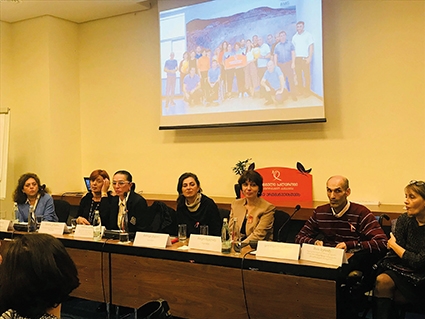Patients with Multiple Sclerosis Selected to Receive Treatment
Patients with multiple sclerosis, their family members and doctors, met at the Radisson Blu Iveria hotel to discuss the disease and its treatment. The event was organized within the frames of the campaign ‘Together for Each Other’ which has seen the active involvement of the state and society.
The event was attended by representatives of the Union of Patients with Multiple Sclerosis and Lead Neurologists. Attendees shared their experiences in the fight against the disease and asked questions of the top specialists. At the end of the event, patients from the Ministry of Healthcare, City Hall and the Parliamentary Committee on Health and Social Welfare prepared and forwarded the appeal, where they once again emphasized the need for adequate treatment of the disease.
“We need state support. We once again appeal to the Government of Georgia to provide financial assistance to make the treatment available,” said patient, Maiko Mgeladze.
“None of the families can be treated with the current resources,” said Neuromedicine Professor and Neurologic Direction Professor, Marina Janelidze. “No patient can support themselves, and this is exactly where the state comes in to aid those in need. In the last 25 years, disease treatment has been advancing. The civilized world has been able to prevent the progress of the disease, and to create a large group of vital organs for the recovery of the immune system.”
Global action 'Together for Each Other' kicked off in spring to increase public awareness of the disease, its timely diagnosis and access to adequate treatment. On May 30, Georgia joined the campaign on the International Day of Sclerosis. Ana Koshadze, Ia Sukhitashvili, Zura Balanchivadze, Goga Chanadiri, Gia Jajanidze, Eka Togonidze, Teona Dolenjashvili, Fridon Sulaberidze and others joined the project as ambassadors of goodwill and called for increased access to treatment to improve the quality of life and reduce the progression of disability.
Multiple Sclerosis is a chronic, progressive neurological disease. 2.3 million people worldwide suffer from it. The first symptoms are predominantly observed among 20 to 40 years and it is the main cause of non-traumatic disability in young people. There are several forms: The recurring-remission form (80-85%), which occurs periodically, sees inflammation of the infection occurring in different parts of the brain, followed by inflammation during remission. The 2nd progressive form is any recurring-remission which after some time transfers to a progressive form, which means the disease is progressing. The patient becomes handicapped. The first progressive form is found in 15% of patients, which has no stages of remission and sees the patient become disabled. The activity of the disease, ie. inflammatory processes in the nervous system that accompany the death of nerve cells in the brain, can occur even in patients without clinical symptoms. The main goal of treatment is to reduce the incidence of the disease at an early stage to prevent the development of disabilities. Today, the treatment of multiple sclerosis significantly reduces limb loss and the progress of disability.
By Anna Zhvania












